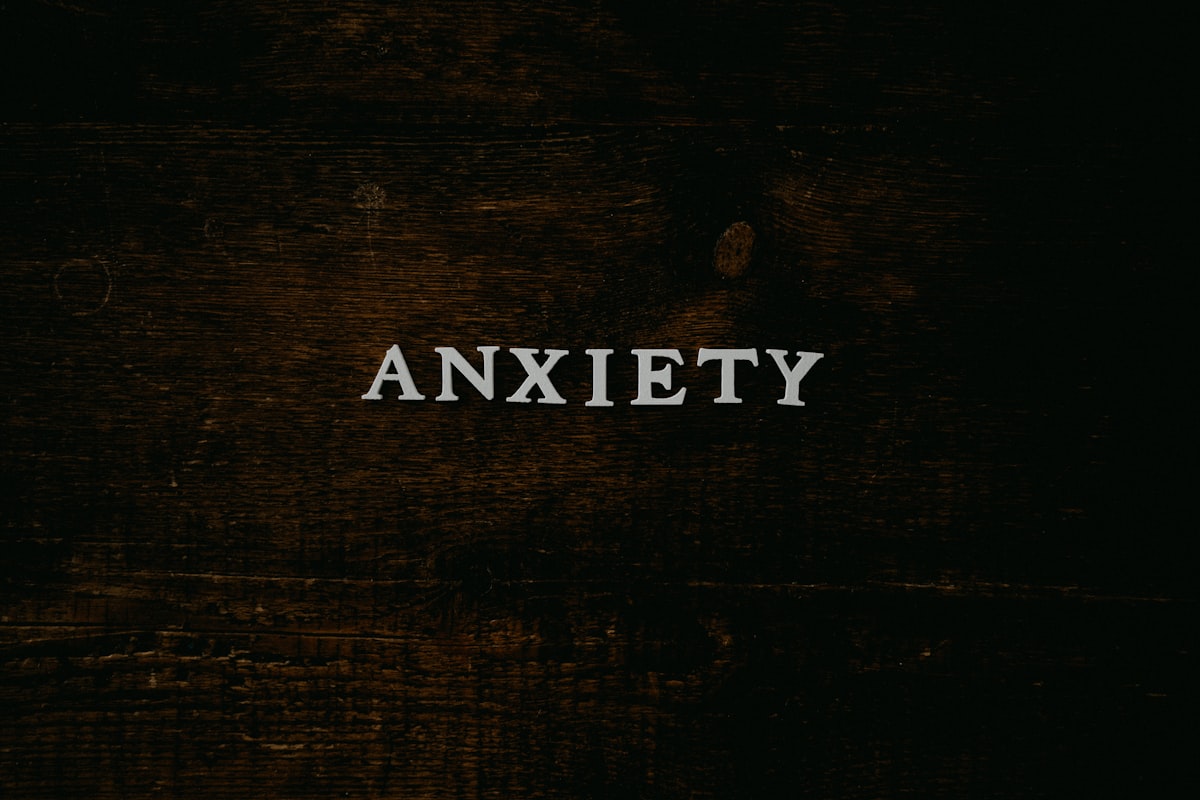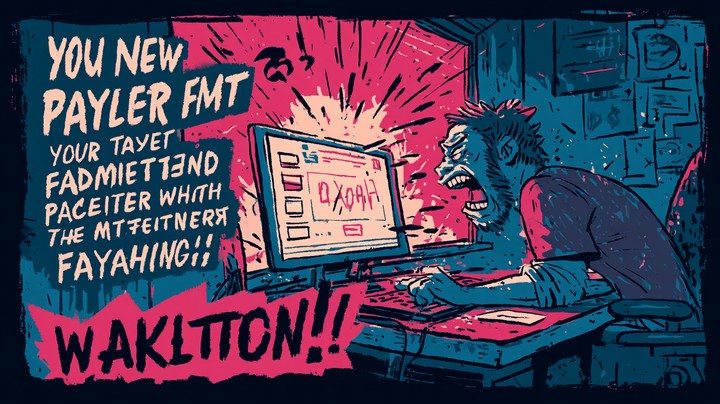How To Identify And Combat Anxiety
All entrepreneurs and business owners experience anxiety at some point during their journey. In this post, I talk openly about my experience learning to identify and combat anxiety.

If you are an entrepreneur, startup founder, CEO, or run a small business, you have probably gone through a period of anxiety or burned out in the past. You may be going through one of these periods right now.
In the land of unicorns 🦄, we don't usually talk about anxiety. We are afraid to dissipate the ultra-powerful startup-founder illusion and how that may negatively affect our business, investment opportunities, or other people's opinion about us.
But we should talk more about it. We all eventually go through hard times, and I think discussing about it openly is important.
That's why I decided to write this post to talk about my own experience, in the hopes it serves to help others to identify and combat anxiety.
Stress VS Anxiety
Even though related, stress and anxiety are different beasts, and it's important to understand the difference between them.
Stress
Stress is a response to an external event. This response is usually both emotional and physical. Being a founder or entrepreneur gives you plenty of situations that can trigger a stress response on you.
A customer has a problem and they left a bad review about your business. Due to a glitch in your platform, you've sent a message to one thousand customers saying that you will charge them 100 times the amount you are actually going to charge them, and now they are confused and scared. You receive a letter from a lawyer with a complaint from a competitor or ex-employee... I've gone through all that stuff.
That's stress. Your body responds immediately. Your breathing quickens, your feel like your heart is racing, and you can also experience dizziness, sweating, or shaking.
Some people say there is good and bad stress. Supposedly, good stress helps you finish stuff in time or be more productive. That's bullshit. After years of being an entrepreneur and running a business, I can confidently say that there's no such thing as good stress. People shouldn't be stressed. Full period.
Anxiety
If the source of stress disappears, usually stress vanishes too. However, if you are suffering from stress for a prolonged period of time, or from multiple sources (relationships, family, health, business, work...), it can lead to anxiety.
Anxiety is our internal reaction to stress. Unlike stress, there's nothing triggering it. When you are suffering from anxiety, you have a feeling of dread or apprehension that has no immediate or obvious cause.
Why are you anxious then? It's because after so much repeated stress, you get into a permanent alert status, "waiting" for the next thing to come and hit you.
Anxiety is much more dangerous than stress. First, because it's much harder to identify. Second, because it does not go away so easily (there's no trigger we can easily cut off, remember?).
Identifying Anxiety
Identifying anxiety is the most important part of the coping process, but it is also the most difficult one.
In my case, it is always the feeling that something bad is going to happen. When I am being bitten by anxiety, I start to get this feeling, like... something really BAD is going to occur. I can't say what, or how, or why. It's almost like I have superpowers and I can predict a disaster that's just about to take place... But I cannot describe it.
I remember calling my parents once to make sure everybody in the family was ok. I was convinced something was amiss.
Your experience may be different, but anxiety always manifests itself as a feeling of dread or incoming disaster, as a fear or apprehension to something that we can't put our finger at.
Acknowledgment Is Key
It took me some time to understand that every time I feel like that, I am going through an anxiety attack. But knowing it really helps me put up my defenses against it.
As soon as I have this sensation, I stop on my tracks and say to myself: Ok, you are having a panic attack.
This, by itself, will not make it go away, but I can rationalize what is going on and prepare myself to combat anxiety.
Breathe, 4-7-8
The first thing you must do when you feel the grip of fear is to stop and breathe. There are many different breathing techniques out there. I've found out that the one that works better for me is the 4-7-8 technique. Make sure to let all the air out of your lungs and repeat this:
- Breath in for four seconds
- Hold your breath for seven seconds
- Exhale for eight seconds
It doesn't matter how fast or slow you count those seconds as long as they all have approximately the same duration. I always start very fast and as I repeat the series, I manage to calm down and can count in a more relaxed way.
Take Your Mind Somewhere Else
Once you've done some breathing exercises, stop what you were doing (working, watching TV, reading your email) and do something different. Go out for a walk, read a book, call a friend or family member, play some music, or listen to it and dance, go to the gym. You can continue working later.
It's important to interrupt your mind flow and do something that you enjoy, something that puts you in a good mood or recharges your batteries.
Talk To Somebody
In my experience, there's nothing like talking to someone. Call a friend, your mom, your dad, or your sister. Tell them that you just called to know how things are going and what happened to them today. Let them talk about stuff that will take your thoughts somewhere else.
Breathing, distracting your mind from your fears, and talking to somebody are just ways of stoppping the panic attack, but won't make your anxiety go away. I'd like to say that I know how to make anxiety go away for good, but I don't. Why is not that easy?

Getting Rid Of Anxiety
As anxiety is not a response to an external event, but an internal reaction to a prolonged stress scenario, it's not so easy to make it disappear. In theory, you should try to eliminate the source of stress that is causing your anxiety.
However, that may not be even possible for a couple of reasons. First, the source of your anxiety may be something you are not willing, or ready, to get rid of, like your business. This is specially true for founders or business owners.
Second, because you may be suffering from multiple sources of stress, like your relationship, your family situation, the bills, your health, etc. Some of them (usually most of them) may be out of your circle of control.
Nevertheless, you need to be bold and get ready to make some changes in your life. Anxiety is no joke, and enduring it for a long time can lead to anxiety disorders and mental health problems.
Ways To Combat Anxiety
Your final goal should be to eliminate the sources of stress that lead you to experience anxiety, but as this is sometimes not easy to do overnight, you need mechanisms to cope with it in the meantime.
Remember, though, these are just ways of dealing with the symptoms. You'll eventually need to eliminate the root of the problem.
Meditation And Mindfulness
Meditation was a life-saver for me. I had always looked at stuff such as meditation and mindfulness with disdain. Neo-hippie stuff for insta-nomads and self-help gurus.
While there is a lot of that out there, meditation and mindfulness are two solid ways of helping you relax and cope with you anxiety. You just need to find reliable ways of learning and practicing (that means, outside of Instagram and TikTok).
Much like exercise, meditation and mindfulness require practice and commitment. It's important to practice every day, and not just when you have an anxiety attack.
Exercise
And talking about exercise, this is also one of the best ways I know to help you cope with anxiety.
When I go to the gym, I don't take my phone with me and, if I do, I use it just to play music, putting it both into flight mode and "Do Not Disturb".
Far beyond the mere benefits for your health, those 60-90 minutes without screens, distractions, notifications, and potential issues or problems related to my business (or anything else) give me peace of mind. Also, the fact that you need to be focused on the exercise helps my mind stay away from stressful thoughts.
I would advise you to do the same. Leave your phone at home, your social media feeds, email, messaging apps, etc, can wait. We live in a hyperconnected world. Being able to disconnect for a while is becoming a rare privilege. Take advantage of it.
For exercise to be helpful, you also need to be constant. Don't so it just when you are anxious or stressed. Try to go as regularly as possible.
Stoicism
Stoicism (much like meditation and mindfulness) has also become a cliché of the digital generation. However, if you get past all those influencers and gurus, stoicism can be a powerful tool to fight against anxiety.
I have talked about stoicism a lot here, and some years ago I wrote a daily reflection on the Daily Stoic book, that usually tops the ranking of page views of the blog every day.
Overall, it has greatly helped me to shift my perspective. Everything we tend to take for granted—our relationships, business, work, family, health—is fleeting. None of it is guaranteed, and we can’t afford to assume it will always be there.
Yes, it is painful and frightful to imagine losing any of that stuff. But when you go through anxiety long enough, stoicism adds a layer of detachment that helps you keep your sanity. A business is just a business, if I lose it, I will work on something else until I can start a new one, if I want to. If my current relationship ends, it will be painful, but it won't be the end of the world. As my grandma uses to say: "There are lots of fishes in the river".
Go Out
Loneliness is never good, but when you are suffering from anxiety, it can make the problem much worse. I know from experience that when you are in that situation, you don't feel like going out to socialize.
But you must do an effort, because being with other human beings, making friends, and talking to them is the best remedy I've found to combat anxiety.
If you have social media, use it as a first contact point to meet people, but don't stay in front of your screen. Hang out with them in real life. Even if you don't, there are multiple ways you can meet people and make friends. I joined a hiking meetup group and started going out with them. Soon enough, I'd made quite a few friends, and we go out from time to time.
When it comes to keeping anxiety at bay, nothing compares to sharing a coffee or a beer with a friend, listening to their stuff, and talking about yours. You may even find out that there are people going through similar problems. That is a powerful way of fighting back.
Ask For Help
Some people are afraid to mention to others that they are experiencing anxiety. Specially, to their couples, families, or friends.
Don't do that. When you are suffering from anxiety, you react differently to things. Small trifles can affect you disproportionately. You can cry, get angry, or be totally paralized by the silliest things.
Let the people you care about know what you are going through so they can understand your reactions. Be honest and open with them. Don't be afraid to ask for help. Let them know you are coping with that and ask them to be patient and helpful.
That is not only fair to them, it will help you feel better and less afraid of what they may think about you.
And if you ever find yourself feeling overwhelmed or like no one truly understands what you’re going through, don’t hesitate to seek professional help. Reaching out to a therapist isn’t something to be afraid of; it’s a step toward healing. For me, it was one of the most valuable investments I’ve ever made.
Conclusion
Entrepreneurship is hard. Entrepreneurs, startup founders, and business owners sometimes find themselves going through anxiety or suffering from other mental health problems.
This is something we don't talk about, not at least when we are experiencing these issues, sometimes out of fear of the consequences. And we should. We are not superheroes, we are just pretty standard human beings trying to make extraordinary things, and sometimes, it is a tad too much.
Disclaimer: I am not a psychologist, and you should not take this as medical advice. If you are unwell, you should probably seek the help of a professional. This blog post is just my way of sharing some tips and suggestions based on my own experiences.




Comments ()